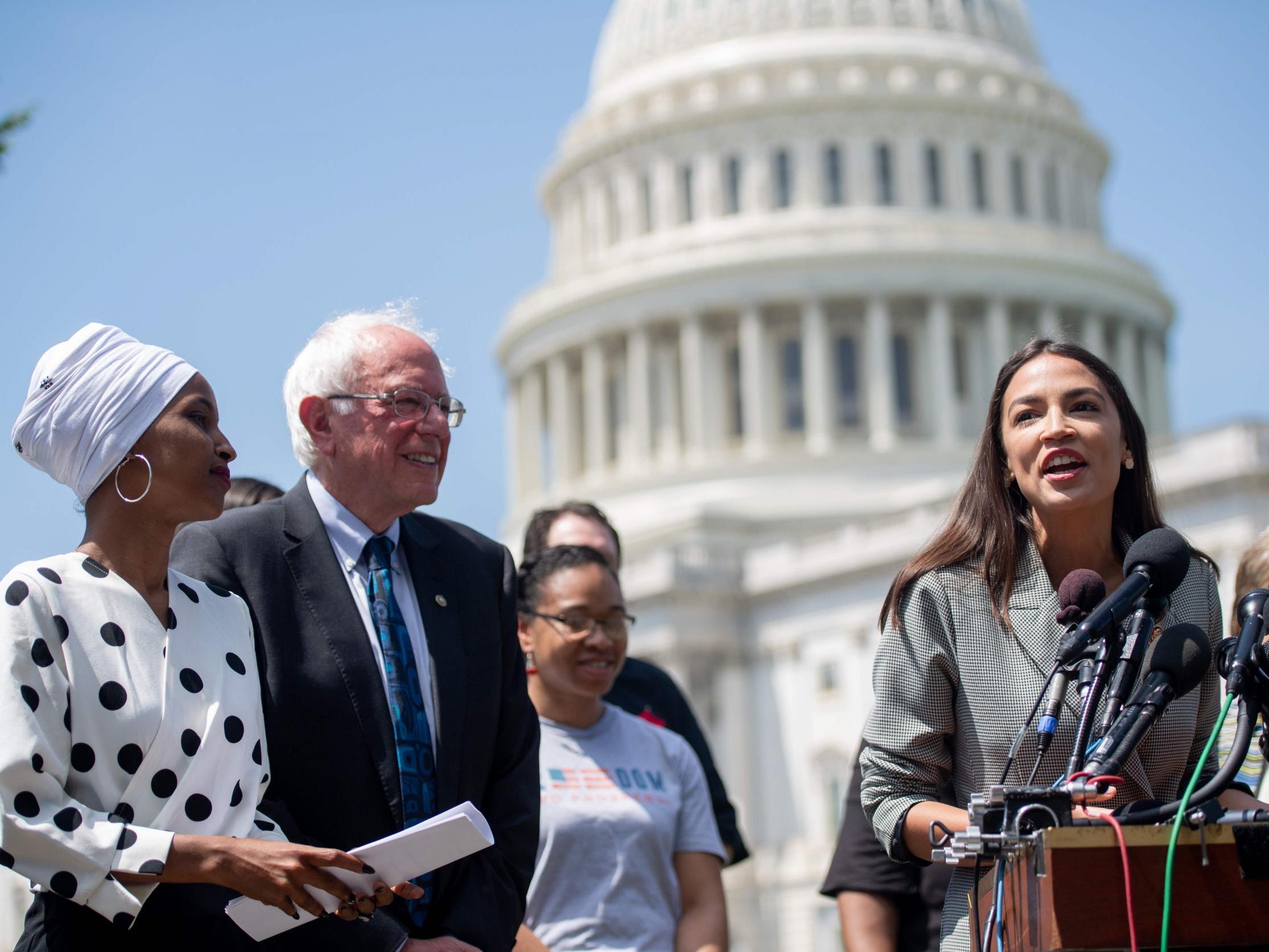The Independent's journalism is supported by our readers. When you purchase through links on our site, we may earn commission.
Elizabeth Warren and Bernie Sanders couldn't be more different — and the Squad know it
Warren benefits from people assuming she and Sanders are exactly the same, but Sanders' endorsement by Ilhan Omar, AOC and Rashida Tlaib should make us think again

Your support helps us to tell the story
From reproductive rights to climate change to Big Tech, The Independent is on the ground when the story is developing. Whether it's investigating the financials of Elon Musk's pro-Trump PAC or producing our latest documentary, 'The A Word', which shines a light on the American women fighting for reproductive rights, we know how important it is to parse out the facts from the messaging.
At such a critical moment in US history, we need reporters on the ground. Your donation allows us to keep sending journalists to speak to both sides of the story.
The Independent is trusted by Americans across the entire political spectrum. And unlike many other quality news outlets, we choose not to lock Americans out of our reporting and analysis with paywalls. We believe quality journalism should be available to everyone, paid for by those who can afford it.
Your support makes all the difference.If you watched the debate on Tuesday night, you may have noticed that Senator Elizabeth Warren used one of her favorite catchphrases: “Bernie and I”. In many ways, Warren has presented herself as the more progressive alternative to Bernie Sanders’ political revolution. Both Senators have co-sponsored multiple bills that embody the progressive cause, after all, including the Green New Deal and Medicare-for-All. Both would tell you how close of friends they are, and have done so on the campaign trail.
But the presidential primary is not about finding the similarities between candidates — it’s about identifying the differences. And while Warren’s “Bernie and I” moments seem to suggest otherwise, there are significant distinctions between the two Senators from New England (as a disclaimer, this will center on their domestic policy stances — however, this Jacobin piece provides valuable insight to their differences on foreign policy.)
It goes without saying that the movement for Medicare-for-All in this country has been led by Sanders. When critics and opponents claim he doesn’t know what he’s talking about, he’ll jokingly remind them he “wrote the damn bill.” This is key, as he has spent virtually his whole career in Washington fighting for a single-payer system nationwide. And although Warren is a co-sponsor of his bill in the Senate, the way she talks about healthcare suggests she forgets this fact. At town halls, Senator Warren has refrained from mentioning the existing bill, referring instead to Medicare-for-All as a “framework” or “idea”.
In addition, Warren becomes evasive when confronted about her plans to pay for the bill, something which Sanders comfortably explains (taxes go up, overall costs go down). Even when late night host Stephen Colbert handed her a perfectly tailored answer on his show, she refused to take it.
Similar half-steps are a pattern in Warren’s other policies. While Bernie’s plan for college affordability includes eliminating all student (and medical) debt, Warren’s caps student loan forgiveness at only $50,000 and has no plan for medical debt. When Bernie’s plan for a Green New Deal includes publicly owned national power grids, Warren refuses to remove the monetary incentive that only worsens our climate crisis.
It is clear that Warren is attempting to please the Democratic base, its leadership, and its corporate donors. Yet this is not the way these radical — albeit common-sense — policies are best achieved. Bernie Sanders has reminded people time and time again that the fossil fuel industry, the pharmaceutical and insurance industry, and the predatory student loan industry are all working tirelessly and funnelling millions to prevent these necessary changes in our society. Warren’s belief that she can achieve such goals in boardrooms and through backdoor deals is a clear misunderstanding of power and influence in the United States, and will lead us to failure.
This approach to finding solutions within the beast itself is of course something Warren prides herself in, and she shows no intention of changing that. Her positions come through a process of being calculated to a fault, where political urgency is trumped by political safety. At the Tuesday debate, she said she “has no beef with billionaires”, and last week walked back her stance on taking corporate money in the general after critics pointed out that makes her open to corporate influence. Sanders in contrast believes that “billionaires should not exist”, and shows he is capable of raising large quantities of donations, raising $620,000 in a single day on Tuesday.
Of all the differences that exist, what should separate them the most is that Senators Warren and Sanders come from diametrically different economic traditions. Bernie comes from a tradition of trade unionism and Eugene Debs socialism. Warren is unabashedly a capitalist, and subscribes to the idea that if we place checks on capitalism, it can promote economic equality. One must look to that with suspicion. She was a registered Republican in my lifetime and, as unearthed footage of her speaking at the Federalist Society suggests, a politically active one at that.
Therefore, it should come as no surprise that Alexandria Ocasio-Cortez, Ilhan Omar, and Rashida Tlaib — the most notable members of the 116th Congress — have endorsed Bernie Sanders instead of Elizabeth Warren. While Warren was defending Dow Corning in a lawsuit from women claiming the chemical corporation’s silicone gel breast implants caused cancer, Sanders was in Congress actively voting to repeal the Hyde Amendment. Their records diverge in serious ways, and the women of color who compose the Congressional “squad” share the values and goals that Sanders has been fighting for, for a lifetime.
Join our commenting forum
Join thought-provoking conversations, follow other Independent readers and see their replies
Comments